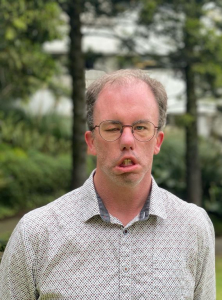Benjamin Eickmann
Profile
Dr. Benjamin Eickmann is a geochemist whose research interests focus on understanding the co-evolution of the atmosphere-ocean system through Earth’s history and geobiological processes in marine and terrestrial hydrothermal systems. In collaboration with research groups in Germany, US, and South Africa. Benjamin uses stable isotope analysis, together with element data to understand (1) changes in the ocean’s temperatures, (2) hanges in the biological community and geobiological interactions, (3) changes in the ocean’s chemistry, (4) understand the response of the ocean to increasing atmospheric CO2 levels and, (5) ultimately lead to refined and comprehensive insights into global biogeochemical cycles and interactions between them.
Benjamin’s work experience includes research positions at universities in Germany, Norway and South Africa. He joined the Department of Geosciences at the Universidad de Los Andes in 2021, where he teaches and supervises undergraduate students on various topics in geochemistry, exogenic processes and geobiology and works with students in interdisciplinary projects that combine geochemistry and palaeontology.
In Colombia, Benjamin’s research interests in the immensely fossil-rich Cretaceous sediments around Villa de Leyva centres on reconstructing the paleoenvironment and identifying the linkage between the evolution of marine reptiles and the dynamics of Cretaceous Oceanic Anoxic Events (OAEs) that serve as ancient analogues to understand future climate changes.
Recently, he has been further involved in more applied projects that help to understand the enrichment of potentially toxic elements in agricultural products, such as cacao, which are of economic importance for Colombia.
Benjamin holds a diploma degree in Geology/Palaeontology from the University of Münster and a doctoral degree in Natural Sciences from the University of Bremen, both in Germany.
Recent Courses
-
2024
-
GEOQUIMICA AMBIENTAL
First period
Bachelor Level
ISOTOPE GEOCHEMISTRY
First period
Bachelor Level
-
Recent Products
Recent Degrees
Dr. rer. nat.
Doctoral degree
Universität Bremen
2009
Alemania
Diplom Geologie/Paläontologie
Master degree
University of Münster
2005
Alemania
Recent Projects
-
2023
-
Comportamiento biofísico de organismos asociados a chimeneas volcánicas
Duration: 12 months
PR.6.2023.10627
Se colectan muestras de diferentes microorganismos de las chimeneas de cerro Machin. A partir de lo anterior, se hará un estudio de las características físicas de los lípidos de los diferentes microorganismos recolectados.
Comportamiento biofísico de organismos asociados a chimeneas volcánicasDuration: 12 months
PR.6.2023.10627
Se colectan muestras de diferentes microorganismos de las chimeneas de cerro Machin. A partir de lo anterior, se hará un estudio de las características físicas de los lípidos de los diferentes microorganismos recolectados.
-
Courses
-
2024
-
GEOQUIMICA AMBIENTAL
First period
Bachelor Level
ISOTOPE GEOCHEMISTRY
First period
Bachelor Level
-
GEOCIENCIAS
First period
Bachelor Level
-
- 2023
- 2022
- 2021
Products
Degrees
-
Dr. rer. nat.
Doctoral degree
Universität Bremen
2009
Alemania
Diplom Geologie/Paläontologie
Master degree
University of Münster
2005
Alemania
Projects
-
2023
-
Comportamiento biofísico de organismos asociados a chimeneas volcánicas
Duration: 12 months
PR.6.2023.10627
Se colectan muestras de diferentes microorganismos de las chimeneas de cerro Machin. A partir de lo anterior, se hará un estudio de las características físicas de los lípidos de los diferentes microorganismos recolectados.
Comportamiento biofísico de organismos asociados a chimeneas volcánicasDuration: 12 months
PR.6.2023.10627
Se colectan muestras de diferentes microorganismos de las chimeneas de cerro Machin. A partir de lo anterior, se hará un estudio de las características físicas de los lípidos de los diferentes microorganismos recolectados.
-
- 2022
